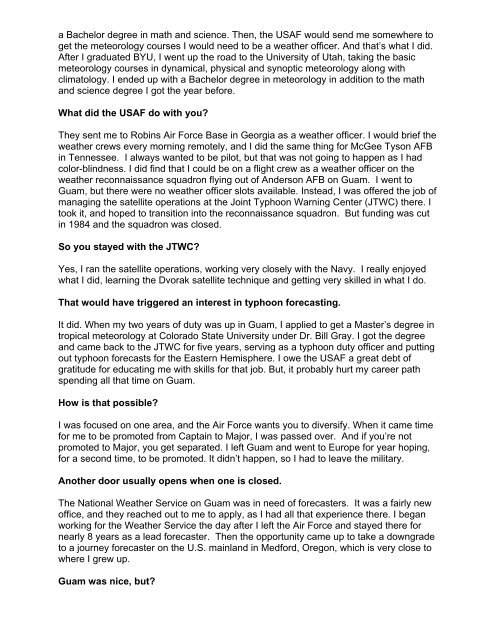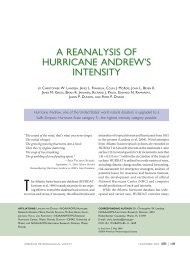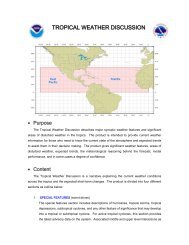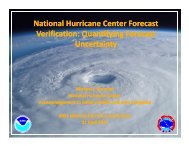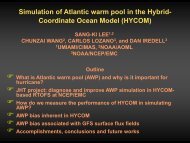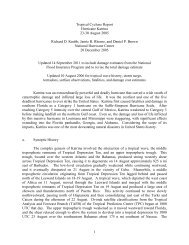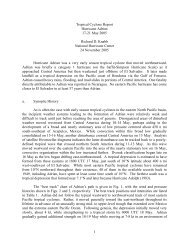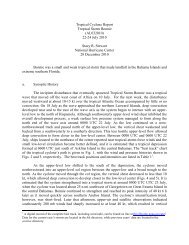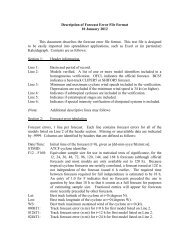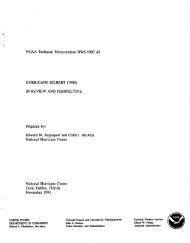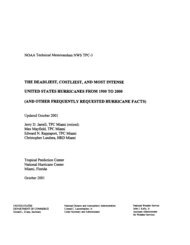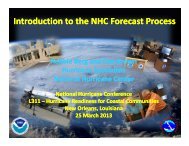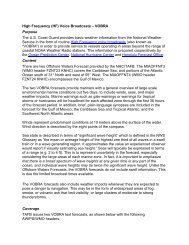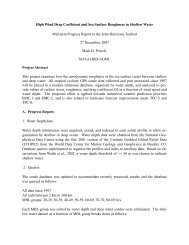Q & A for NHC Dan Mundell - National Hurricane Center - NOAA
Q & A for NHC Dan Mundell - National Hurricane Center - NOAA
Q & A for NHC Dan Mundell - National Hurricane Center - NOAA
You also want an ePaper? Increase the reach of your titles
YUMPU automatically turns print PDFs into web optimized ePapers that Google loves.
a Bachelor degree in math and science. Then, the USAF would send me somewhere to<br />
get the meteorology courses I would need to be a weather officer. And that’s what I did.<br />
After I graduated BYU, I went up the road to the University of Utah, taking the basic<br />
meteorology courses in dynamical, physical and synoptic meteorology along with<br />
climatology. I ended up with a Bachelor degree in meteorology in addition to the math<br />
and science degree I got the year be<strong>for</strong>e.<br />
What did the USAF do with you?<br />
They sent me to Robins Air Force Base in Georgia as a weather officer. I would brief the<br />
weather crews every morning remotely, and I did the same thing <strong>for</strong> McGee Tyson AFB<br />
in Tennessee. I always wanted to be pilot, but that was not going to happen as I had<br />
color-blindness. I did find that I could be on a flight crew as a weather officer on the<br />
weather reconnaissance squadron flying out of Anderson AFB on Guam. I went to<br />
Guam, but there were no weather officer slots available. Instead, I was offered the job of<br />
managing the satellite operations at the Joint Typhoon Warning <strong>Center</strong> (JTWC) there. I<br />
took it, and hoped to transition into the reconnaissance squadron. But funding was cut<br />
in 1984 and the squadron was closed.<br />
So you stayed with the JTWC?<br />
Yes, I ran the satellite operations, working very closely with the Navy. I really enjoyed<br />
what I did, learning the Dvorak satellite technique and getting very skilled in what I do.<br />
That would have triggered an interest in typhoon <strong>for</strong>ecasting.<br />
It did. When my two years of duty was up in Guam, I applied to get a Master’s degree in<br />
tropical meteorology at Colorado State University under Dr. Bill Gray. I got the degree<br />
and came back to the JTWC <strong>for</strong> five years, serving as a typhoon duty officer and putting<br />
out typhoon <strong>for</strong>ecasts <strong>for</strong> the Eastern Hemisphere. I owe the USAF a great debt of<br />
gratitude <strong>for</strong> educating me with skills <strong>for</strong> that job. But, it probably hurt my career path<br />
spending all that time on Guam.<br />
How is that possible?<br />
I was focused on one area, and the Air Force wants you to diversify. When it came time<br />
<strong>for</strong> me to be promoted from Captain to Major, I was passed over. And if you’re not<br />
promoted to Major, you get separated. I left Guam and went to Europe <strong>for</strong> year hoping,<br />
<strong>for</strong> a second time, to be promoted. It didn’t happen, so I had to leave the military.<br />
Another door usually opens when one is closed.<br />
The <strong>National</strong> Weather Service on Guam was in need of <strong>for</strong>ecasters. It was a fairly new<br />
office, and they reached out to me to apply, as I had all that experience there. I began<br />
working <strong>for</strong> the Weather Service the day after I left the Air Force and stayed there <strong>for</strong><br />
nearly 8 years as a lead <strong>for</strong>ecaster. Then the opportunity came up to take a downgrade<br />
to a journey <strong>for</strong>ecaster on the U.S. mainland in Med<strong>for</strong>d, Oregon, which is very close to<br />
where I grew up.<br />
Guam was nice, but?


